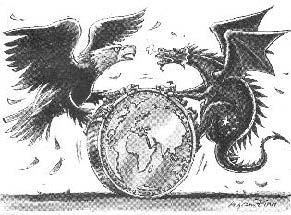Tip of the Iceberg of Racist Imperialist War in Africa

The deaths of four US Special Forces Troops in Niger in October are the tip of the iceberg of racism and imperialist war.
The media were all over Trump’s dismissive racism in his phone call to Myeshia Johnson, the widow of Army Sergeant La David Johnson. Others have concentrated on the racist and sexist insults of Democratic Congresswoman Frederica Wilson who criticized him for it. But this is the iceberg’s very tip.
Racism and the US military
Still above water—but barely—is the wider reality of racism and the US military. Soldiers in the imperialist military are working class men and women who face racism, poverty and exploitation in civilian life. This is particularly true of the Army—imperialism’s cannon fodder, which is 22% black, while African Americans make up only 13% of the US population. The Army has also historically been the site of dissent and rebellion against US imperialism, especially during the Vietnam war. Imperialism’s reliance on the most exploited members of society is the crack in its armor. This is as true in China and India as it is in the US. During imperialist war, soldiers on both sides can play a revolutionary role.
US military role in Africa
Just below the surface of the water—discussed by some media outlets—is the growing role of the US military in Niger and throughout West Africa. Starting with the Obama administration, the US has used the Authorization of Use of Military Force passed in 2001 for the war in Afghanistan to fight wars throughout the world. Obama sent 100 troops to Niger in 2013 as “support for intelligence collection” with French troops in the region. Four years later, there are about 1000 troops in the region “supporting” a French-led mission to combat “Islamist extremists.”
The bulk of the iceberg is hidden deep underwater. The US Africa Command (AFRICOM), organized in 2007, has 6,000 troops in Africa, conducting 3,500 exercises, programs, and engagements each year – almost 10 missions each day. It has one major base in Djibouti on the Red Sea, and has used bases all over Africa.
While the US claims to be worried about “transnational Islamist terror,” the real mission is combating US’ rival China.
A 2008 article published by the US Army War College said, “Now China has achieved a stage of economic development which requires endless supplies of African raw materials and has started to develop the capacity to exercise influence in most corners of the globe…history predicts that distrust and uncertainty will inevitably lead the People’s Liberation Army to Africa in staggering numbers.”
For their part, the Chinese understand that the US threatens their larger plans in Africa. Lin Zhiyuan, a leading military analyst argues, “By building a dozen forward bases or establishments in Africa, the US will gradually establish a network of military bases to cover the entire continent…[T]he African continent is taken as a strong point to prop up the US global strategy. Therefore, AFRICOM facilitates the United States advancing on the African continent, taking control of the Eurasian continent and proceeding to take the helm of the entire world.”
As we explained in the previous issue, China is building a military organized “to take the helm of the entire world.” The US ruling class is willing to kill millions to make sure that doesn’t happen. Eventually this will lead to war, with Africa one of the hot spots. That’s what’s below the surface of the news of US troops along the border between Mali and Niger.
In Africa as around the world, workers have no stake in war between one group of imperialists and another. In fact, working-class soldiers will be the ones who kill and die for the imperialists. But they are also the ones who can turn these wars into revolutionary wars. That is why patient political organizing with soldiers and their families is so important.
It’s also important to work harder to reach workers in other parts of the world. Self-critically, we can do better in translating Red Flag into French on our website to reach out to readers in countries such as Mali and Niger.

